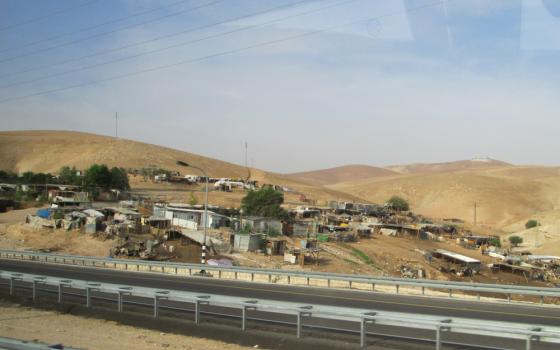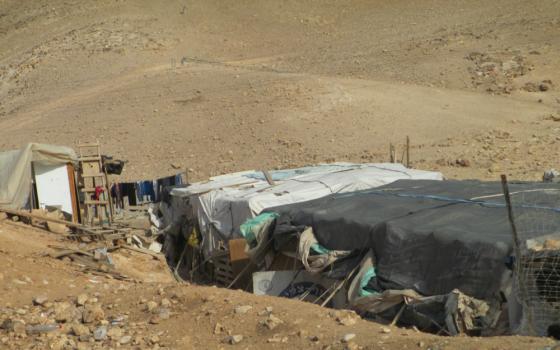I can't get the image of Pope Francis praying at the wall in Bethlehem out of my head. A simple, yet profound gesture, touching deeply something within me, within us all: a desire for justice, freedom and peace. Written on the wall, just minutes before he arrived, was "Pope we need some 1 go speak about justice."
I travelled on an Interfaith Peace-Builders Olive Harvest delegation to Israel and Palestine in the fall of 2012. Pope Francis' trip elicited memories and emotions from my own experience there. It also renewed my resolve to speak about what I saw and heard.
On our last day there, we went to a Jahalin Bedouin village (Khan al-Amar) on the eastern outskirts of Jerusalem. It's not far from Ma'ale Adumim, the large settlement outside Jerusalem, and E-1, the zone designated for further expansion of settlements. A new major highway, called the Tel Aviv-Jordan Peace Highway and connecting Jerusalem with Jericho, had been widened recently, cutting off access to the village. Our bus stopped on the edge of the highway and we had to hop across the guardrails, walk down and then up a hill to get there. As we listened to Eid Abu Khamis tell the story of the Jahalins, we got a good picture of what it means to live in Area C in the West Bank. Area C, formed after the Oslo accords, takes up 62 percent of the West Bank and is under total (military and civil) control of Israel. The Jahalin Bedouins had lived for centuries in the Negev. They were displaced after the establishment of the state of Israel and came as refugees to this area in the early 1950s.
Being semi-nomadic, the Bedouins rely on goats and sheep for their livelihood. The territory for grazing their animals has shrunk. First, the Israeli Defense Force (IDF) declared part of the land a military zone and confiscated it. Later the settlement Kfar Adumim was built there. Over the years the boundary for the settlement has expanded, reaching closer and closer to the Bedouins' dwellings. Khamis told us that 10 years ago they had 1,600 sheep and goats and 25 camels, but now they have only 140 sheep and goats and no camels. Nor are they allowed to go to the Old City of Jerusalem to sell their animals in the Bedouin market there.
As we sat in a tent listening to Khamis's story about Israel refusing to connect them to electricity or running water, we could see huge electric lines on the adjoining hill.
The children from Khan al-Amar had to walk a long way to go to school. In the early 1990s they asked that a school be built. Nothing happened. Then they asked for a school bus. Still nothing happened. So with the help of the Comboni Sisters and other Italian NGO's, a school was built in 2009 out of old tires and mud. It sits like a beacon of hope in the village.
But then we learned that a demolition order against the school had been issued by Israel's Civil Administration because the school was constructed without a building permit, something that is nearly impossible to obtain in Area C. (We were told that 27 schools in Area C were under demolition orders.) We were relieved to learn that a reprieve was given, only to find out that the reason was because there are plans to displace the entire village to a small area near Jericho. In fact, all the Bedouins in the area are at risk of being dislocated.
Every year, the neighboring settlement petitions the court to have the school demolished. In May of this year, the court denied the petition, again citing the on-going discussion about plans for dislocation. At least this time it recognized the possible harm to the children. Court battles continue, but the hope of stopping the dislocation dims.
I often wonder how the people of Khan al-Amar are surviving. In February of this year, I read that the Civil Administration confiscated playground equipment for the school that the Italian government donated. I wonder how Eid Abu Khamis is providing for his family. He told us that after the school was built permits to work in the neighboring settlement were revoked. I wonder what hope the children have for their future.
One can get the impression from media coverage of the negotiations between Israel and the Palestinian Authority that they are equal parties, that there is a level playing field. For me, Khan al-Amar, sitting in the shadow of Ma'ale Alumim, symbolizes the power differential that really exists.
I join Pope Francis in praying for a way that leads to peace. I pray for justice.
"We need some 1 go speak for justice."
Resources:
United Nations Office for the Coordination of Humanitarian Affairs: Maps, Reports and Fact Sheets about Area C, settlements, the barrier and communities in the Jerusalem periphery at risk of forced displacement and the humanitarian impact.
TED Talk by Comboni Sr. Alicia Vacas who has been working with Bedouins and refugees.
[Jan Cebula, a Franciscan Sister of Clinton, Iowa, is liaison to women religious in the United States for Global Sisters Report.]



